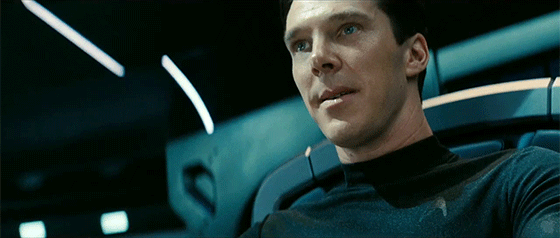Star Trek Into Darkness Is Pure, Self-Aware Escapism
In other words, lots of Spock-related ear gags. Yes!

You don’t expect much when you go to see an action film. Since Michael Bay woke up one morning with a handful of cash and the determination to ruin cinema and childhood dreams simultaneously, the genre has been hit and miss.
So, walking into Star Trek Into Darkness — J.J. Abrams’ second foray into the Star Trek universe — you have to take pause. This man holds in his hands not only this generation of Star Trek films, but an entire run of Star Wars films, too. What if he loses his touch? Who will be our saviour then?
Abrams’ Star Trek can’t be classic Star Trek. A generation removed from those exploration-obsessed chronicles, it’s under a much greater burden to deliver clear-cut answers. There is less of a moral grey area here; good intentions are never good enough and evil is inescapable. We see no rehabilitation, just Hollywood justice. But it’s easy enough to forgive. Abrams and his team care about these characters and the legacy of the story, trekking carefully through the canon with respect to the audience and the original’s motivations.
Zachary Quinto is glorious, nailing Spock’s “will he, won’t he” relationship with emotional detachment. Chris Pine is occasionally disappointing as Captain Kirk, seemingly going through the motions of space-faring Lothario and dragging the plot along with him. The real gem is Benedict Cumberbatch. Removed from the shackles of Sherlock and schlocky war films, he delivers a convincing and menacing performance as the film’s villainous powerhouse.
Despite almost degrading into parody at several points during the film (Kirk’s inter-species promiscuity, Spock-related ear gags, and McCoy’s “I’m a doctor not a…” catch-all are all used to excess), it’s in some of these referential hiccups that the film is at its best: lighter than the constant gloom of the modern Hollywood blockbuster.
In much modern sci-fi/action, there’s only vengeance as a goal, thinly-wrapped in vague plot points, copious lens flares and beautifully-crafted CGI explosions. While Abrams does have a long-term love affair with the lens flare, each instance of death and destruction in Into Darkness is treated with due reverence, not as a casual act of violence to sate the audience’s bloodlust: there are emotional consequences. Early in the film, when one key character is lost, we see genuine regret and a sense of loss amongst the valiant crew of the Enterprise. Death in the film is necessary — perhaps even mandated — but that doesn’t mean it comes without repercussions. The end result is some understanding of motivations, instead of being baffled by (or ignoring entirely) who’s killing who and why.
Even at its most sci-fi intense, Into Darkness is grimly aware of these realities, but the crew of Enterprise are still members of Star Fleet. There’s always a light at the end of the tunnel, a transporter beam in a volcano. Star Trek has always worn its sins on its sleeve, and it’s no different here, delivering pure, self-aware escapism.
It’s still unclear whether or not Abrams is the hero we fans need, but there’s a glimmer of hope as the credits roll. Sure, Into Darkness occasionally abandons plot for ‘necessary’ fight sequences and some of the film’s lines are so corny it defies belief, but it doesn’t pretend to be the final frontier of cinematic grandeur. They’re the journeys of the Starship Enterprise; what more could you want?
_
Star Trek Into Darkness opens in cinemas nationally tomorrow.
_
Alex Sol Watts is a Wee Waa-born and Sydney-based marketer with just enough time on his hands. You can find him on most of the internet as @solwat
